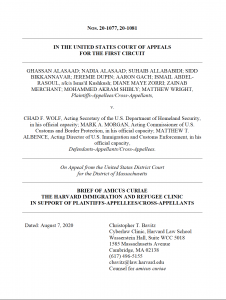
Last week, the Cyberlaw Clinic filed an amicus brief (.pdf) in the United States Court of Appeals for the First Circuit in Alasaad v. Wolf, Case Nos. 20-1077, 20-1081. The case addresses the constitutional implications of electronic device searches at the border. The American Civil Liberties Union, the Electronic Frontier Foundation, and the American Civil Liberties Union of Massachusetts brought the case against the Department of Homeland Security, asserting claims by travelers whose phones and laptops were searched without warrants. The Clinic submitted the brief on behalf of the Harvard Immigration and Refugee Clinical Program, which directly represents individuals applying for U.S. asylum and related protections and advocates on immigration policy issues at the local, national, and international levels. The brief emphasized the chilling effects on speech of warrantless, suspicionless device searches and highlighted the ways in which such government conduct deters the free exercise of expression and association. Spring 2020 Cyberlaw Clinic students Andrew Mettry and Jubilee Cheung and summer 2020 Cyberlaw Clinic interns Priyanka Krishnamurthy and William Walker worked with Clinical Instructor Mason Kortz and with HIRC to draft the brief.
Filed in: Legal & Policy Work
Tags: Andrew Mettry, Cyberlaw Clinic, Harvard Immigration and Refugee Clinical Program, HIRC, Jubilee Cheung, Mason Kortz, Priyanka Krishnamurthy, William Walker
Contact Office of Clinical and Pro Bono Programs
Website:
hls.harvard.edu/clinics
Email:
clinical@law.harvard.edu